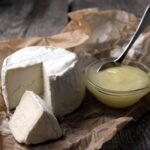No, dogs should not eat string cheese since its high fat content can lead to weight gain, pancreatitis and other health issues. The stringy texture of the cheese can also pose a choking risk for dogs. A small amount of string cheese as a treat is fine for dogs on occasion, however in general you should avoid feeding any kind of cheese to your dog.

Caution: This food is generally considered risky by the veterinary community. Dogs should not eat this food and should be monitored for adverse effects.
| Food Safety | Safe to eat in small amounts but should be avoided in favor of healthier treats |
|---|---|
| Nutritional Issues | String cheese is high in fat, therefore can lead to rapid weight gain in dogs |
| Potential Risks | Obesity, diabetes, pancreatitis, and cardiovascular issues. Eating too much string cheese in one sitting can cause gastrointestinal issues. It can also trigger an allergic reaction in lactose-intolerant dogs. |
| Symptoms | Abdominal discomfort, vomiting, diarrhea |
How Much String Cheese is Bad for Dogs?
A few pinches of string cheese as an occasional treat is generally safe for dogs. Large amounts can cause lactose intolerance issues and the high fat content can lead to digestive distress in dogs.
Why is String Cheese Unsafe for Dogs?
String cheese is not necessarily unsafe, but dog owners should ensure not to feed it regularly to their dogs due to its high calorie count and fat content. Eating too much string cheese can lead to a host of health issues for dogs including diabetes, pancreatitis, obesity, and cardiovascular issues.
Frequently Asked Questions
-
String cheese is high in salt, calcium, and protein as well as fat which all make it a tasty treat your dog will want to eat.
-
The stringiness of the cheese can pose a choking risk for dogs. If you are giving string cheese to your dog as a treat, it is better to chop it up and then feed it.






